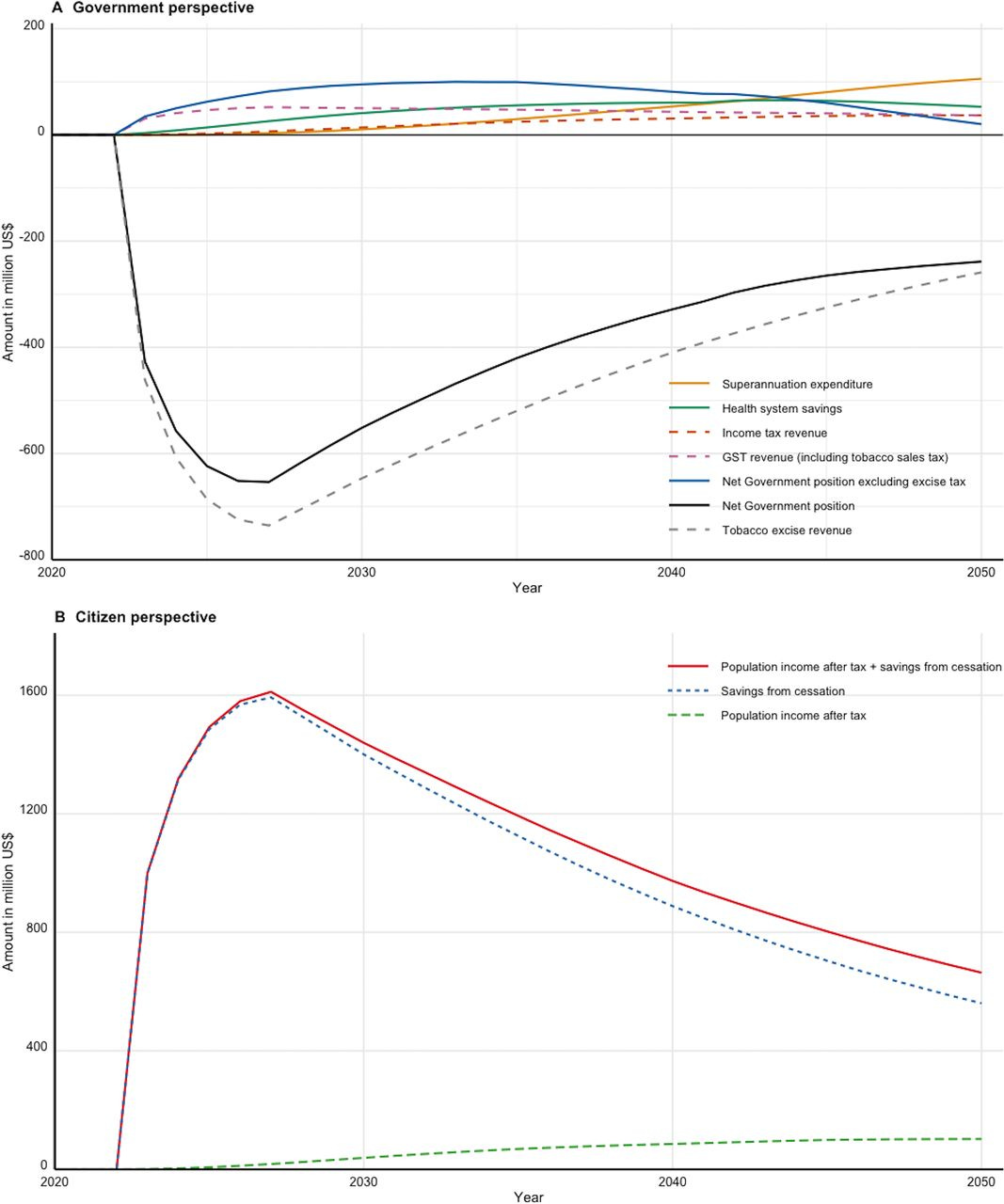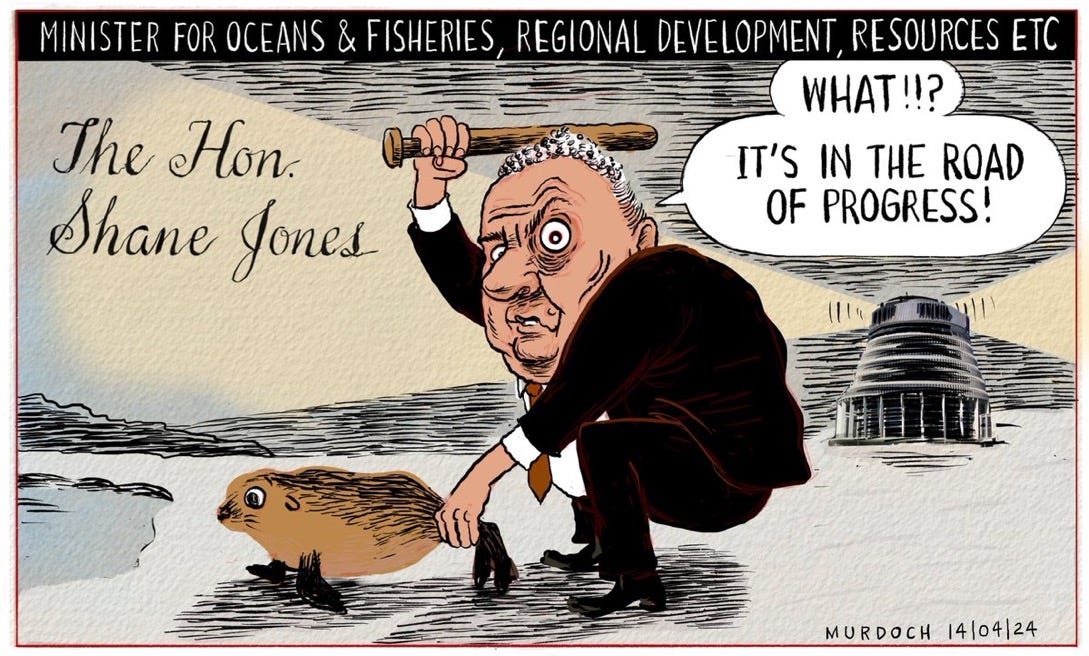
TL;DR: The six news items that stood out to me at 7:26 am today are:
The Lead: Casey Costello never passed on to Cabinet official advice with an analysis for the BMJ showing that keeping Labour’s smokefree changes would have boosted consumer disposable incomes by $51 billion by 2050, more than offsetting $19 billion in net losses for the Government. Newsroom Marc Daalder (See more analysis and detail below)
Geopolitics: Iran attacked Israel for the first time, firing hundreds of missiles and drones, but almost all were shot down by Israel’s ‘Iron Dome’ defence system, along with help from US anti-missile ships and anti-missile defences in Jordan and Saudi Arabia. Iran said it had finished the attack. Israel is considering a response, but the United States has said it won’t support an Israeli retaliation. Axios
Scoop: Data from cameras on board commercial fishing boats has revealed what conservationists have long suspected: that deaths of ocean wildlife in nets and lines have been significantly under-reported. Sunday Star Times-$$$ Andrea Vance
Deep-dive: It was a scheme Ross Berry hoped would make millions. Instead, 40 hungry men wound up crammed in a house, and his business is in ruins. Stuff Steve Kilgallon
Politics: Brooke van Velden is pushing for the Government to halve sick leave to five days, despite assurances from National this would not happen. Sunday Star Times-$$$ Rob Stock
Housing: An Independent Hearings Panel ruled in favour of a 5,000 home development on the old Formosa Golf Course in East Auckland on Friday, overcoming the objections of local residents and Auckland Council.
(Paying subscribers can see more detail and analysis below the paywall and in the podcast above. We’ll open it up for public reading, listening and sharing if they give permission by getting over 100 likes.)
‘Massive benefits for consumers offsetting losses for Govt’
The Government’s surprise decision to reverse Labour’s smokefree changes appears to fly directly in the face of its self-professed drive to help consumers and taxpayers reduce the cost of living and be an enemy of ‘big government’ and high taxes.
Official advice provided to Associate Health Minister Casey Costello and obtained by Newsroom’s Marc Daalder for his article published on Friday showed the main benefit for the Government of reversing the changes would slow a reduction in smoking and therefore increase excise tax revenues by $1.5 billion in the next four years.
However, the advice to Costello included an analysis done for the British Medical Journal (BMJ) showing that keeping the smokefree changes would create a benefit for consumers and taxpayers totalling NZ$51 billion (US$30.7 billion) by 2050 through earning more money over longer lives and spending less on tobacco. This would have more than offset projected losses to the Government of NZ$19 billion (US$11.5 billion) over that period through lower excise revenues and lower pensions payouts because people died earlier.
Costello did not pass it on to Cabinet, emphasising instead the extra tax revenues.
Here’s the core part of the analysis with the key chart below (bolding mine):
Our modelling suggests that the Smokefree Aotearoa 2025 Action Plan passed into law by the A/NZ Government in 2022 is likely to produce substantial economic benefits for the population in addition to the previously calculated health and health equity benefits. From the perspective of citizens, a cumulative gain in post-tax income of US$1.8 billion was seen by 2050, resulting from reduced tobacco-related morbidity and mortality in the working-age population. This was also met with a cumulative gain in disposable income by US$29 billion by 2050, due to reduced expenditure on tobacco. From a government revenue perspective, both gains and losses were observed. A reduction in healthcare expenditure by US$1.3 billion, and a combined increase of US$1.9 billion in income tax and GST revenue resulted from the policy package. However, due to increased superannuation payments and reduced tobacco excise tax revenue, the government would experience a cumulative shortfall of US$11.5 billion by 2050.
To our knowledge, our study is the first to evaluate the potential fiscal consequences of implementing a tobacco endgame strategy from both government and citizen perspectives. Our estimates are consistent with a large body of evidence documenting the detrimental impact of tobacco spending on household budgets, particularly for the most disadvantaged socioeconomic categories. An analysis of A/NZ census data has estimated that among low-income households with at least one member who smokes, up to 14% of the non-housing budget was spent on tobacco. Similar findings have been reported in other high-income countries as well as low-income and middle-income countries. A recent modelling study evaluating the economic loss attributable to cigarette smoking in the USA estimated the total loss in annual population income in 2020 at US$735.1 billion. In A/NZ, smoking is strongly concentrated among Indigenous Māori and people on low incomes; therefore, our estimated increases in disposable income would represent a pro-equity income transfer. Analysis done for the British Medical Journal (BMJ)

Chart of the day
Rich Americans keen to fly

Climate graphic of the day
AMOC running amok

Cartoons of the day
Progress?

Choices made

Timeline-cleansing nature pic of the day
Locked and loaded
Ka kite ano
Bernard
















Share this post